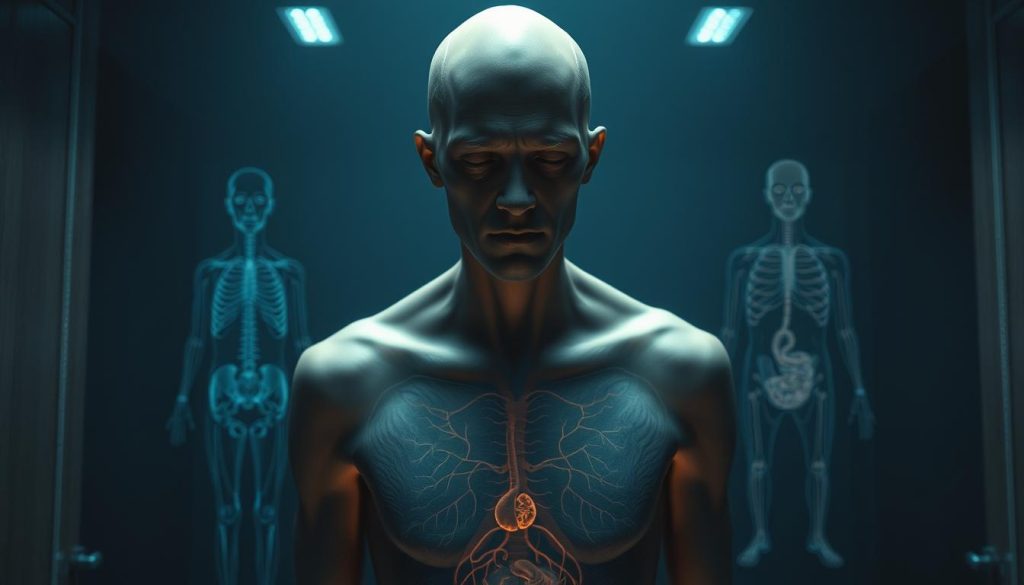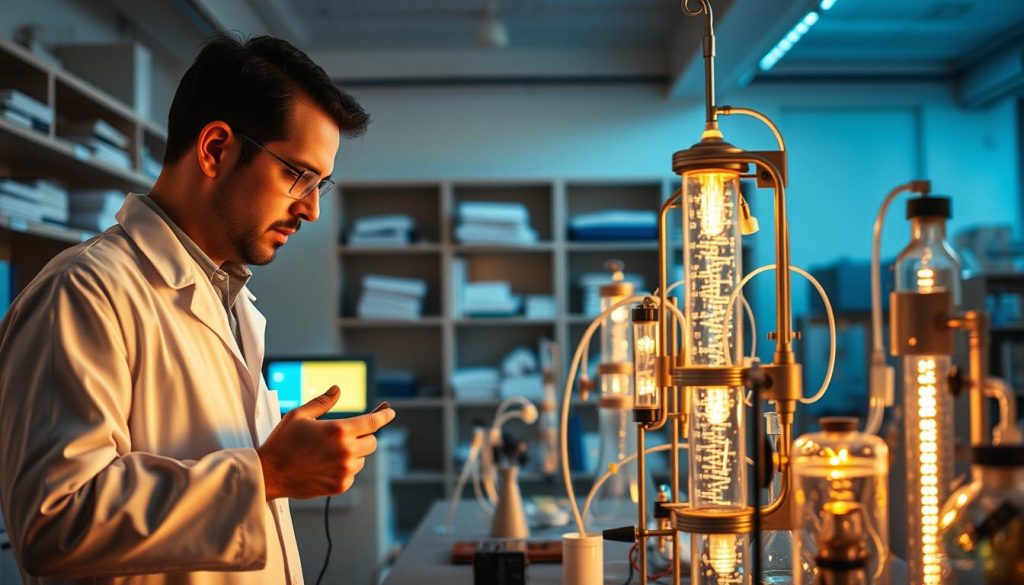Ever wondered why the air feels fresh after a thunderstorm? Or why being by the ocean makes you feel alive? It might be because of negative ions. These tiny particles are thought to have many health benefits.
The World Health Organization talks about how important our environment is for our health. It shows how our surroundings can deeply affect us.
Research shows that negative ions can change our bodies in amazing ways. As people become more interested in negative ions and their effects, it’s key to learn more. This article will look into the benefits and the science behind them.
What Are Negative Ions?
Negative ions are a fascinating part of ion science. They are atoms or molecules with an extra electron, making them negatively charged. This process, called ionization, creates charged particles that affect air quality.
Definition of Negative Ions
In chemistry, negative ions, or anions, are found naturally or made artificially. They have more electrons than protons, so they’re negatively charged. Knowing how they form and act is key in ion science, which studies their interactions and benefits.
Sources of Negative Ions
Negative ions are found in nature and can be made artificially. Places like waterfalls, forests, and during rainstorms are full of them. These natural spots help enrich the air with negative ions we can breathe.
Modern technology also makes negative ions. Ionizing machines create them, boosting indoor air quality by adding more air ions.
Understanding where negative ions come from helps us see their value in our lives. From natural waterfalls to ionizing machines, these particles are crucial for better air quality.
How Negative Ions Affect the Body
Negative ions are getting more attention from scientists. They want to know how these tiny particles affect us. Found in places like waterfalls and forests, they might change our body’s cells in good ways.
Basic Mechanisms
Negative ions might make our cells work better. They could neutralize positive charges in our body. This could make our cells healthier.
They might also help our cells make more energy. This is because they could improve how our cells use oxygen.
Physiological Changes
Negative ions could change how our body works. For example, they might help us breathe better. This is because they could help our lungs take in more oxygen.
This could improve our blood flow and energy. Studies show this can help our heart stay healthy.

Negative ions might also make us feel better mentally. They could help control serotonin, which affects our mood. Scientists are still learning how these particles help our body and mind.
Negative Ions and Human Body Health Benefits
Exploring the health benefits of negative ions reveals many advantages for our bodies. They improve air quality and create a healthier environment. This leads to better breathing and more oxygen, boosting energy and brain function.
Studies show that negative ions strengthen our immune system. They make us less likely to get sick. They also help us sleep better, reduce asthma symptoms, and fight off seasonal allergies. This makes our daily lives better.
Negative ions also have a positive effect on our minds. They increase serotonin, helping with depression and anxiety. This leads to clearer thinking and better emotional balance. Many people who try negative ion treatments notice big improvements in their mood and mental health.
The table below shows some key health benefits of negative ions. It gives a quick look at how they can improve our health and life quality:
| Health Benefit | Description |
|---|---|
| Improved Respiratory Function | Enhances oxygen intake, reducing respiratory issues. |
| Boosted Immune Response | Makes the body more resilient to infections. |
| Enhanced Sleep Quality | Promotes deeper, more restful sleep. |
| Reduced Asthma and Allergy Symptoms | Helps in alleviating symptoms related to asthma and allergies. |
| Improved Mental Health | Increases serotonin levels, reducing anxiety and depression. |
By focusing on negative ions and wellbeing, we can see real improvements in our health. As research grows, using negative ions in our daily lives could become a key way to better our health.
Mental Health Benefits of Negative Ions
Research shows that negative ions can greatly improve emotional wellbeing. They can make people feel happier and less stressed. This is true in places with a lot of stress and in therapy.
Mood Enhancement
Studies say negative ions can make you feel better by boosting serotonin in your brain. This helps control your mood. Natural places like forests and waterfalls are full of these ions, helping your mental health.
Stress Reduction
Negative ion therapy can lower stress and anxiety. Places with lots of negative ions make people feel calmer and more stable. This is good for your emotional health. Being around negative ions, naturally or through therapy, can help your mind.
Negative Ion Therapy: An Overview
Negative ion therapy has become popular for its health benefits. It started in the early 20th century to improve air quality and wellness. Over time, it has evolved into a recognized alternative health therapy.
This therapy uses negative ions to clean the air and boost health. These ions are found in nature, like near waterfalls. They make us feel refreshed and energized.
It can be used in wellness centers, spas, and even at home. This makes it easy for people to try it out.
People say it can help with mood, breathing, and allergies. This has made more people interested in trying it. It’s becoming more accepted in both traditional and holistic health.
| Aspect | Description |
|---|---|
| Historical Background | Early 20th-century development, focused on enhancing air quality and health. |
| Application Settings | Wellness centers, spas, home-based devices. |
| Health Benefits | Mood enhancement, respiratory improvement, allergy relief. |
| Nature of Therapy | Use of negative ions to purify air and enhance well-being. |
Ionization Therapy for Wellness
Ionization therapy is becoming more popular for its health benefits. It uses negative ions to improve well-being. This therapy is used in clinics and is also used at home.
It’s interesting to see how people use ion therapy equipment at home. We’ll look at what users say and what manufacturers claim.
Clinical Applications
Doctors are studying ion therapy for many health issues. These include breathing problems, sleep issues, and mood improvement. Studies show it might help by making the air better and boosting serotonin in the brain.
Top hospitals are looking into how it can help patients more. They want to know how ion therapy equipment can improve health outcomes.
Home-based Ionization Devices
More people want to use ion therapy at home. They want to make their living spaces better. Devices like AirTamer and AtmosRx release negative ions to mimic nature’s benefits.

| Device | Features | User Rating |
|---|---|---|
| AirTamer A310 | Portable, USB Rechargeable, 150-hour runtime | 4.5/5 |
| AtmosRx Portable Ionic | Wearable, Ultra-Lightweight, 30-hour runtime | 4.3/5 |
| Ionbox 20m | Compact, High Output, USB Powered | 4.7/5 |
Ionization therapy is promising for health and wellness. More research is needed to fully understand its benefits.
Negative Ions and Air Quality Improvement
Negative ions are key to better air quality. They are charged particles found in nature, like near waterfalls or after storms. These ions help clean the air by sticking to pollutants like dust and pollen.
This makes these particles too heavy to stay in the air. They fall to the ground or get caught by air filters.
Studies by the Environmental Protection Agency show that negative ions can make indoor air healthier. Using devices like ionizers or air purifiers can help remove pollutants. This is very helpful in cities where air is often polluted.
People who use air purifiers with negative ion technology have seen better air quality. They have fewer respiratory problems and allergies. This shows how important negative ions are for clean air in homes and offices.
| Benefits | Impact |
|---|---|
| Air Purification | Removes dust, pollen, and other airborne particles |
| Airborne Contaminants Reduction | Decreases spread of allergens and pathogens |
| Negative Ions for Cleaner Air | Enhances overall indoor air quality |
Scientific Research on Negative Ions
Negative ion research has caught the eye of scientists because of its health benefits. This section looks into key studies to understand their effects and what they mean.
Key Studies
Many journals have shared findings on ions and their positive effects on health. A study in the American Journal of Epidemiology found that negative ions can lower depression symptoms.
Another study in the Journal of Alternative and Complementary Medicine showed that negative ions help with breathing. This is good news for people with long-term breathing problems.

The table below shows the main points from these studies. It helps us see the science behind them.
| Study | Journal | Areas Examined | Key Findings |
|---|---|---|---|
| Reduction in Depressive Symptoms | American Journal of Epidemiology | Mental Health | Significant reduction in depressive symptoms |
| Respiratory Function Improvement | Journal of Alternative and Complementary Medicine | Respiratory Health | Enhanced respiratory function in chronic patients |
Findings and Implications
The studies suggest big changes for health and policy. They show that ions could be a natural way to help people feel better. This is great for those living in cities where natural ions are scarce.
More research is needed to learn how ions work over time. This will help us use them more in health care.
Real-Life Experiences with Negative Ions
User testimonials offer valuable insights into the benefits of negative ions. Many people have shared their experiences on wellness forums. They talk about feeling more energized and less tired after being around negative ions, like near waterfalls or in forests.
Product reviews online also support these stories. Customers love ionization devices, saying they help with breathing and air quality at home. One person said a negative ion generator helped with allergies, making it easier to breathe and sleep.
Another person felt more calm and relaxed, thanks to more negative ions in their home. These stories show how negative ions can improve our health and mood.
Interviews and case studies also highlight these experiences. For example, office workers felt happier and less stressed after using negative ion air purifiers. These stories show the positive effects of negative ions on our well-being.
Are There Any Risks Associated with Negative Ions?
While negative ions are known for their benefits, it’s important to look at the potential risks too. Health studies show that using ionizers should follow safety rules to avoid too much negative ion exposure. Even though negative ions can make us feel better, too much of them might harm us.
Doctors say that negative ions are usually safe for a short time. But, too many of them could be harmful. Some devices, like air ionizers, can make ozone, which can hurt our breathing. This is why it’s key to have good air flow and follow the maker’s instructions when using these devices.
Some people have reported headaches, dizziness, and trouble breathing after being around negative ions for a long time. So, it’s crucial to know when to stop using them. It’s clear that we need to use negative ions wisely to avoid risks and enjoy their benefits.

